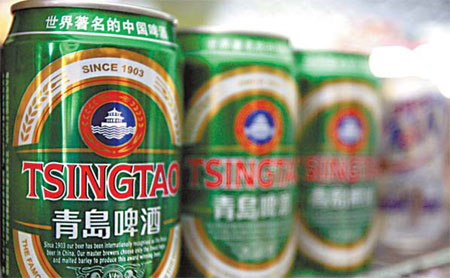
Tsingtao Brewery Co Ltd, China's best-known beer brand, posted a 17.8 percent rise in second-half profit on solid revenue growth, despite high raw material prices and intense competition, and pledged to improve sales growth in 2009.
China's fiercely competitive beer market suffers from overcapacity as nearly 400 brewers vie with an increasing number of foreign companies expanding into the world's largest market by volume.
Tsingtao, the country's No 2 brewer by volume, competes with Heineken, Carlsberg, Kingway Brewery and the CR Snow joint venture between China Resources Enterprises and SAB Miller.
Tsingtao said it aims to achieve full-year sales growth that is 2 percentage points higher than that of the national beer industry and increase the sales volume of products with high margins.
Tsingtao, a domestic sponsor of last summer's Beijing Olympics, said late on Wednesday that July-December net profit rose to 318.4 million yuan (US$46.58 million) from 270.25 million yuan a year earlier.
Full-year net profit was 699.6 million yuan against 538.9 million yuan in 2007. Full-year sales revenues rose 16.6 percent to 15.8 billion yuan.
Japan's largest beer maker, Asahi Breweries, a joint venture partner of Tsingtao since the 1990s, agreed in January to buy a 19.9 percent stake in Tsingtao from Anheuser-Busch InBev, the world's biggest brewer, for US$667 million, making it Tsingtao's second largest shareholder.
Anheuser-Busch, which brews Budweiser, Stella Artois and Beck's, will hold 7 percent of Tsingtao after the deal.
Lower barley prices are expected to help Tsingtao's gross margin in the current second quarter, and the brewer's volume growth year-to-date has outpaced the industry average, Goldman Sachs said.
Barley prices have dropped 45 percent from peak levels last May, but Tsingtao first needs to use up its high-cost stocks, Macquarie said in a research note.
Tsingtao's Hong Kong-listed shares gained 1.9 percent in the second half of last year, compared with a more than 33 percent drop in mainland companies traded in Hong Kong and about a 35 percent fall in the broader market.
(China Daily April 10, 2009)